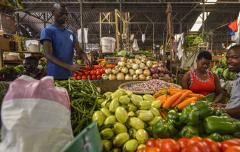Kivu Green Energy tackles one of Africa’s biggest energy gaps
in a series of stories, Sustainable Energy for All (SEforALL) is profiling five entrepreneurs in Africa who recently received the inaugural “Energy Access Booster” awards, which honors those who are implementing energy access projects, including green mini-grids, sustainable mobility, refrigeration and energy for agriculture and drinking water. The awards are in support of Sustainable Development Goal 7 to provide reliable, affordable and clean energy for all by 2030.
Highlights
The Democratic Republic of the Congo (DRC) has one of the lowest rates of electrification and energy consumption in the world, with less than a fifth of the urban population having access to energy. Those that do have access often experience irregular and erratic supply service. Most receive their power from self-supplied or neighborhood-owned diesel generators, an expensive, high-maintenance, unreliable and unclean energy source.
The DRC is one of the top 20 energy deficit countries in the world, with 83% of the population without access to electrification, according to Tracking SDG7: The Energy Progress Report 2018 Many households and businesses are too far to be connected to a sufficient power supply. The energy infrastructure required to deliver power installation is often dilapidated and mismanaged. There is also a lack of local technical capacity and training opportunities to bolster a burgeoning renewable energy sector.
Obtaining access to electricity typically requires six different procedures, takes 44 days and is prohibitively expensive for most potential users, according to the World Bank. In addition, there is no smart metering and there is a lack of payment options.
The country is estimated to have 2,929 megawatt (MW) of unmet energy demand. Despite this energy shortage, the DRC has the capacity to generate an estimated 70 gigawatt (GW) of power from solar PV systems. Off-grid solar power has a potentially huge role to play in delivering energy to communities.
Kivu Green Energy (KGE) was established in August 2015 when it acquired the largest commercial energy provider in Beni, North Kivu, near the DRC’s eastern border with Uganda. Since this acquisition, KGE has pushed to convert the company’s diesel generated power to solar PV and storage.
In 2016, KGE oversaw a pilot installation of a 35 kilowatt (kW) solar installation at a university in Beni. In June 2017, KGE installed the first commercial solar PV and storage system in eastern Congo, providing more affordable, reliable electricity to more than 60 homes, businesses, and humanitarian and peacebuilding organizations through a 55kW mini-grid with a 100kVa backup diesel generator.
Customers in Beni have welcomed KGE service because it is less expensive than other available energy options, more quiet than relying on noisy generators, and can power more appliances. “The KGE electricity supply is stable. It is also cheaper than a home solar system, which can cost $4,000 and the result is not always satisfactory because you have to change the batteries every two years as well as other accessories,” said Patrick, a local customer.
KGE’s decentralized solar micro-grids can be installed quickly and provide reliable, affordable and scalable electricity to improve humanitarian assistance, health care and education. They can accelerate economic development; stabilize ICT infrastructure; reduce deforestation and dependence on wood for fuel; and strengthen local security due to the presence of well-lit buildings and street lights.
The venture is headed by Jonathan Shaw, who co-founded KGE with Archip Lobo, a Congolese development expert who now serves as chief marketing officer. The management team consists of both Congolese and Americans with experience in the region. For example, Shaw traveled and worked in North Kivu to research his dissertation for a recent PhD in African history from the University of Michigan, while also establishing a local research center and several start-up businesses.
In a country rated as one of the most difficult places in the world to start and run a business, North Kivu represents a particular challenge since the province has suffered from Ebola outbreaks and armed banditry. The region’s energy poverty reflects that instability.
The deregulation of the energy sector in 2014, however, created an opportunity for significant private sector intervention. “While the context is complex and operationally challenging, KGE has been able to function for nearly four years,” said Kyle Hamilton, KGE’s director of strategy and development. “Our solar microgrids provide critical energy access to conflict-affected and underserved populations as well as NGOs and health officials working to provide care for Ebola victims in response to the current Ebola outbreak.”
KGE’s business model is based on developing off-grid solar mini-grids, initially in urban areas, to deliver to energy to hundreds of thousands Congolese households. The mini-grids will be equipped with GSM-based smart meters, while diesel energy generators will provide a backup energy source. Customers will be able to pay with mobile money payment systems.
KGE’s upcoming 1.3MW solar-based hybrid mini-grid in the North Kivu city of Goma will service 700 households, businesses and NGO groups. A particular focus is to empower young Congolese entrepreneurs and reach businesses that work with thousands of rural households to spread the benefits of energy to them.
The Energy Access Booster award will help KGE to achieve its goal of installing a total of 25MW solar-based mini-grids by 2020, while simultaneously conducting market and technical feasibility studies for other new urban markets in the DRC. KGE’s long-range plan is to produce a total of 250MW from solar-based mini-grids by 2023 and achieve 1 GW by 2033 to serve 5 million urban customers.
“Through the Energy Access Booster program, KGE will receive the support necessary to build a strong foundation as we seek to scale and make an impact in Congo by providing electricity to businesses and households that need it,” said Shaw. “What’s more, this support will also help us develop the technical capacity necessary to train Congo’s workforce for the emerging renewable energy sector and to address Congo’s current energy deficit and poverty.”
Related content

News
07 Jul 2023

Opinion
23 Dec 2022

SDG7 News
16 Nov 2021

SDG7 News
30 Aug 2021
